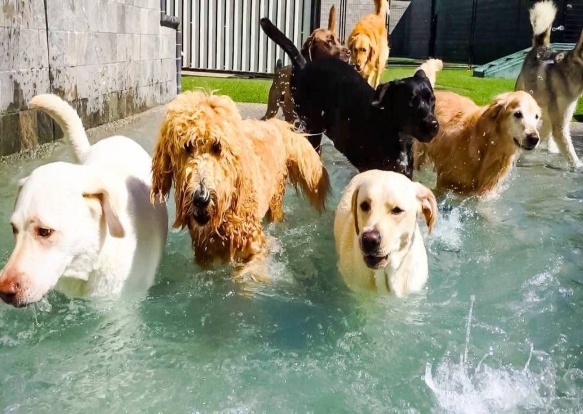Dog socialization is extremely important in having a healthy, happy dog. Puppies generally come without a built-in sense of fear and willingly accept new stimulus. As dog’s age, they become less accepting of new people, places, sounds, and surfaces. An adult dog that has, for example, never seen a person on crutches may instantly halt when that person comes into his line of sight, cease walking, and commence barking. He has no idea what that person with “an abnormal amount of legs” is and isn’t interested in learning. An adult dog of the same age and breed that was socialized as a puppy and used to seeing people in wheelchairs, on crutches, using a walker, etc, will see the person on crutches and have no reaction. Other examples I have encountered:
- A beautiful girl that has never walked on laminate and freezes when asked to do so. This dog’s ability to visit people who have laminate is zero without counter conditioning.
- A dog that has never been exposed to people of different ethnicities absolutely refuses to walk on a leash past any person of an ethnicity she was not exposed to.
- A dog that had zero exposure to dogs or people outside of his family now cannot walk on a leash due to an extreme fear reaction to any dog or person he sees.
If all of these dogs had an opportunity as a puppy to be exposed to the items that instill fear, encountering any of these items would not garner a reaction that is abnormal.
Having given examples of why it is important, you might ask, what are examples of things I should expose my puppy to? Where are the places I can take my puppy? When is it safe to take my puppy to places? What defines socialization?
Dog Socialization Defined
Socialization is, in short, exposing your dog to every possible sight, sound, smell, surface, person, and dog you can find. Your dog meeting your family, playing well with the dog you have in your house and your family’s dog, and taking lovely walks in your neighborhood IS NOT socialization. Socialization IS going to a big box warehouse (i.e. Lowes or Home Depot) and hearing all of the loud sounds that accompany a warehouse environment, seeing people in hard hats, coveralls, of different ages, sizes, ethnicities, smelling lumber and paint, walking on concrete and asphalt, and riding in the car to get there.
Where to Take Your Dog to Socialize
 Check out local restaurants and pubs in your area to see what their dog policy is. Even if you are outside on the porch, your dog is getting exposed to lots of new sounds, people, surfaces, and smells. Head to your local bookstore or hardware store, go to a park and look for ones that have lots of people, dogs, ducks, kids, playground equipment, mulch. Take a walk on a greenway, take a walk downtown, head to a pet store, walk in an outside mall, arrange playdates with lots of other dog-friendly dogs, take your dog to school when you pick up your child, think outside the box! And if you have a goal in mind for your dog; a therapy dog, an emotional support dog for a college student, a companion for a long haul trucker, be sure to expose your dog to all of those unique things they might encounter.
Check out local restaurants and pubs in your area to see what their dog policy is. Even if you are outside on the porch, your dog is getting exposed to lots of new sounds, people, surfaces, and smells. Head to your local bookstore or hardware store, go to a park and look for ones that have lots of people, dogs, ducks, kids, playground equipment, mulch. Take a walk on a greenway, take a walk downtown, head to a pet store, walk in an outside mall, arrange playdates with lots of other dog-friendly dogs, take your dog to school when you pick up your child, think outside the box! And if you have a goal in mind for your dog; a therapy dog, an emotional support dog for a college student, a companion for a long haul trucker, be sure to expose your dog to all of those unique things they might encounter.
When to Take Your Puppy Out
Your veterinarian will have suggestions or recommendations based on his/her personal opinion on when it is safe to take your dog out. And you should never discount your vet’s opinion, but also do your research on why socialization is important and read the research that specifically addresses vaccines versus socialization before making a final decision.
Contact Furry Fundamentals to learn more about dog socialization

